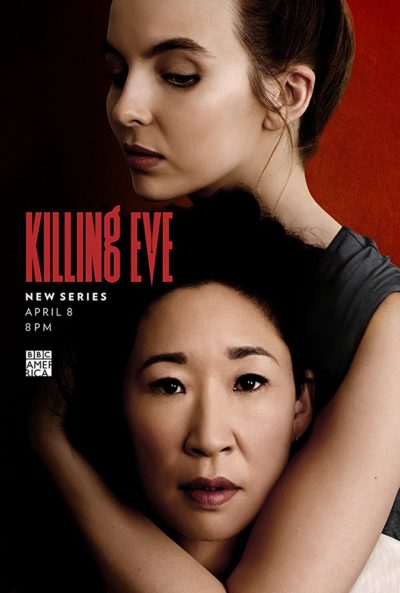 ★★★★
★★★★
“You should never call a psychopath a psychopath. It upsets them.”
 A genuinely organic hit on BBC America, this generated so much word of mouth that the ratings for this show behaved in an unexpected fashion. Including those who DVR’d the show, viewership increased for each episode over its 8-week run. That’s a rare feat these days, and is testament to the show’s unique qualities. So confident were the station in the show, that is was renewed for a second season before it had even premiered – another unusual achievement. But then, this show is arguably unlike anything else on television.
A genuinely organic hit on BBC America, this generated so much word of mouth that the ratings for this show behaved in an unexpected fashion. Including those who DVR’d the show, viewership increased for each episode over its 8-week run. That’s a rare feat these days, and is testament to the show’s unique qualities. So confident were the station in the show, that is was renewed for a second season before it had even premiered – another unusual achievement. But then, this show is arguably unlike anything else on television.
The heroine is Eve Polastri (Oh), an officer in the British intelligence service, MI-5, who believes there’s a connection between a string of assassinations across Europe. She’s right: they were all carried out be Oksana Astankova (Comer), codename “Villanelle”. Oksana is a pure, undiluted psychopath, working for a shadowy Russian organization known as “The Twelve”, under handler Konstantin Vasiliev (Bodnia). Polastri’s career is apparently ended when a witness to one of Oksana’s hits is killed in her care, and she’s fired from MI-5. However, this allows her to be recruited by Carolyn Martens (Shaw) for a off-book investigation into Villanelle.
Eve is therefore able to continue digging into Oksana’s history and activities, but the target becomes aware of the interest – signalling that knowledge by using “Eve Polastri” for her identity during a job. From here, it’s a spiral of increasingly intense cat-and-mouse, with Eve and her team tracking the assassin, while also being hunted by her. It all grows deeply personal for both Eve and Oksana, the two women developing a perverse long-distance relationship that’s more of a fixation, on both sides. Note: I’m not using “perverse” in relation to the homoerotic elements. It’s just… really bizarre. As in, “Villanelle breaking into Eve’s house, in order to have dinner with her” strange.
 The show is defiantly messy in terms of its characters, who manage both to embody the stereotypes of the dogged law-enforcement official and the slick, femme fatale, while also subverting them. From the viewpoint of this site, Oksana is likely the more interesting. As a high concept, imagine a female version of Dexter: charming and affable on the surface, yet extraordinary lethal – and capable of flicking that switch in a moment. The difference is, Villanelle has chosen not to control and direct her “dark passenger” so much as embrace them fully, and is given the chance to do so by the profession into which she is recruited. It also allows her to indulge her fondness for haute couture.
The show is defiantly messy in terms of its characters, who manage both to embody the stereotypes of the dogged law-enforcement official and the slick, femme fatale, while also subverting them. From the viewpoint of this site, Oksana is likely the more interesting. As a high concept, imagine a female version of Dexter: charming and affable on the surface, yet extraordinary lethal – and capable of flicking that switch in a moment. The difference is, Villanelle has chosen not to control and direct her “dark passenger” so much as embrace them fully, and is given the chance to do so by the profession into which she is recruited. It also allows her to indulge her fondness for haute couture.
She enjoys her work, to an almost scary degree, disdaining the simplest and most directly effective methods, too. That’d be boring, especially for such a free spirit. Why shoot, when you can kill your target by stabbing them in the eye with a hatpin instead? On the other hand, she is also incredibly manipulative. Oksana may not be able to feel any genuine emotions of her own, yet she’s supremely good at faking them, and will happily say what you want to hear, if she thinks it’ll let her use you for her own advantage. Her handler doesn’t so much control the incredibly self-confident Villanelle as unleash her in the direction of the intended target. Who inevitably ends up dead… just not necessarily quite as he would prefer.
The contrast to Eve could hardly be greater, and that perhaps goes some way to explaining the agent’s obsession: Oksana is everything Eve wants to be. Okay, except for the “psychopathic killer” bit. But that’s just a detail, right? For Eve is stuck in a rather tedious relationship, and works a job where her talents are under-used and even less appreciated. The more she learns about her target, the greater the appeal seems to be, and it works both ways: Villanelle wants “someone to watch movies with”. Or says she does anyway: this could just be another manipulative ploy, it’s impossible to be sure. Espionage, counter-espionage and assassination is a murky world at the best of times. Here? You can’t see the murk for the deceit, and at times the lies become a bit overwhelming.
After a long career expressing earnest concern on medical soap Grey’s Anatomy, Oh’s career has undergone a spectacular sea-change of late. First, there was the awesome Catfight, and now this, little if any less successful, which allows Oh to show her remarkable range of expressive… er, expressions [Seriously: you could spend an entire episode just watching her face, to the exclusion of everything else, and still be entranced]. Comer is nowhere near as well-known, but I doubt we’ll see a more memorable female character on television this year than Oksana, combining childish innocence, girlish glee and savage psychopathy. When it comes to Emmy time, it will be a travesty if at least one of them is not nominated – and ideally both. The supporting cast are no slouches either.
I will confess to being less than whelmed by the final episode which, rather than ramping up, petered out into something approaching a slumber party. Admittedly, it’s a very weird one, befitting the show, and sees Eve violate Oksana’s personal bubble of living space, partly in retaliation for the same thing happening to her earlier. But it offers no sense at all of closure: this may be a side-effect of the show having been pre-renewed. I guess there’s no point making any effort to wrap things up, when you know you’re going to be back.
Still, for 7½ episodes, this was far and away the best thing on American TV at the moment. To get one of these amazing characters in a show would have been more than acceptable. Having both in the same series provides a one-two punch of heroine and anti-heroine that’s almost unsurpassed in television history. Buffy and Faith, or Xena and Callisto, perhaps come close – although they were only story arcs. Here, Eve and Oksana are a pure, undiluted focus, and it’s glorious. The second season can’t get here soon enough.
Creator: Phoebe Waller-Bridge
Star: Sandra Oh, Jodie Comer, Fiona Shaw, Kim Bodnia




